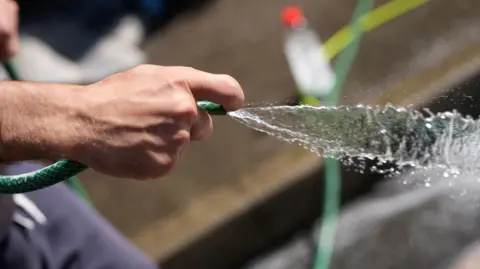Disabilities, paddling pools and other hosepipe ban questions answered
 Getty Images
Getty ImagesThe UK's first hosepipe ban of 2025 came into force in Yorkshire on 11 July.
It follows one of the warmest and driest springs on record, with total rainfall between February and June around half of what would normally be expected in the region.
Yorkshire Water's ban, which also covers the use of sprinklers, is aimed at conserving dwindling supplies of water, with local reservoirs and canals drying out fast in the heat.
But what exactly are the rules and are there exemptions? A week into the ban, we answer some of the most pressing questions including those from BBC website users.
How long will the ban last?
No exact date has been given, but Yorkshire Water chief executive Nicola Shaw told BBC Radio 5 Live last Friday that it was expected to last until winter.
By this point, it is hoped reservoirs will have refilled with some much-needed autumn rain.
Yorkshire's last hosepipe ban, imposed in August 2022, was lifted just over three months later.
It does not necessarily follow that the timescale will be similar this time around, especially with the current ban having been imposed earlier in the calendar year.
Are there exemptions for people with disabilities?
Yes, blue badge holders received letters last week informing them they were exempt from the ban.
People on Yorkshire Water's priority services register, which includes some customers who are vulnerable, elderly and households with very young children, are also exempt.
It's worth noting that this register only includes people who have proactively asked to be on it, so you are not included automatically if you fall into any of those categories.
Customers on a WaterSure tariff - a scheme for people who struggle to pay their bills - are exempt, but only if they are on one for medical reasons.
Can I still fill up a paddling pool?
Only with water from a tap and not with a hosepipe - so it's worth keeping a bucket or two handy. The same applies to hot tubs, if you already have one.
However, Yorkshire Water says that "newly purchased" hot tubs that are "fixed structures" are exempt, so these can be filled with a hosepipe.
Similarly, if a hot tub is used for medical purposes, you can use a hosepipe to fill this, the company says.
 Getty Images
Getty ImagesWhat about businesses?
Businesses are exempt from the ban if the hosepipe is needed for commercial purposes. The likes of sports clubs, golf courses and professional car washes are therefore unaffected, although Yorkshire Water says it is encouraging companies to limit water usage "where they can".
However, if you wash your neighbour's car for a bit of pocket money or extra weekend cash - and it is not your actual job - you'll have to stick to buckets and sponges for now.
What are the rules around swimming pools?
Hosepipes cannot be used to top up private domestic pools, unless it is needed for medical or veterinary reasons, unless fish are kept in it, or unless the pool is being constructed and needs to be filled as part of the building work.
Public swimming pools are exempt from the rules, but town and city centre fountains, most of which are run by local authorities, are not.
With that in mind, several councils said they would not be refilling fountains, but would continue to operate water features that recycled water.
 Getty Images
Getty ImagesAre there any other exemptions?
Yes and it's good news if you own horses or cattle.
The rules say you can wash animals and their yards or stables with a hosepipe, although being "as efficient as possible" is encouraged.
Also, if you've planted grass seed in the garden you can water that patch of turf for up to 28 days afterwards.
However, people falling into this bracket have been asked to "respect the spirit" of the restrictions.
Is the hosepipe ban enforceable?
Yorkshire Water says it issues warnings to anyone suspected of breaching the restrictions, adding that this action alone is "usually enough".
However, the company can prosecute, with courts able to issue fines of up to £1,000 for a breach.
Has it been effective?
Yorkshire Water says the ban saved nearly 100m litres of water during last weekend's heatwave, when compared with the two heatwaves recorded in June.
The company's director of water, Dave Kaye, says he understands the restrictions are "frustrating" for customers, but says it's "important we all continue to do our bit".
The firm has also welcomed a huge increase in the number of leaks being reported to them in recent weeks, which it says is crucial in the battle to save water.
Yorkshire Water says it has cut leaks by 15% in recent years, but some frustrated customers claim more needs to be done.
Elsewhere in the country, Hampshire and the Isle of Wight will be placed under a hosepipe ban from 21 July. Gloucestershire, Oxfordshire, Berkshire and Wiltshire will all be covered by similar restrictions, imposed by Thames Water, from 22 July.
